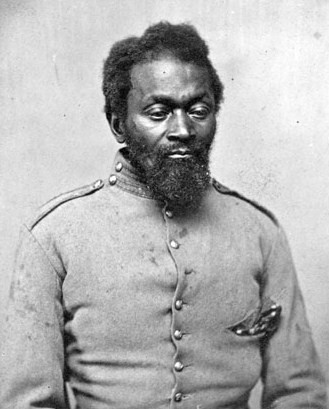
Nicholas Biddle becomes the first African American in uniform to be wounded in the Civil War. Nicholas (Nick) Biddle, did odd jobs around town, and befriended many of the men who were part of the areas many militia groups. In April of 1861, after the Confederate attack on Ft. Sumter caused President Lincoln to issue a request for 75,000 volunteers to defend the Union, Nick Biddle did just that. At the age of 65, and being African-American, Nick was not acceptable for Federal service. He was, however, able to sign up for a three month enlistment with the newly formed Washington Artillery of the 25th Regiment of Pennsylvania Volunteers, out of Pottsville. He was assigned to one of his friends, Captain James Wren, as his orderly. Supplied with a new uniform paid for by the members of the unit, Nick was now ready and willing to serve the Union cause.
On April 18th, 1861, five companies of the 25th Volunteers including “Nick” , along with two companies of U.S. Regulars (soldiers who were part of the army before the war) arrived by train from Pennsylvania to Baltimore’s Bolton Station. The rail line that brought them to Baltimore ended, and in order to travel further south to the Capitol, the soldiers had to disembark and march through Baltimore to the rail station at Camden Station and board trains belonging to another railroad. Immediately upon their arrival, they knew they were in trouble. Maryland was a border state with sharply divided politics, and many of Baltimore’s citizens in the early days of the war left no doubts that they sided with the secessionists. As the remainder of the 25th nearly reached their destination at Camden Station, all hell broke loose as the 2,000 or so members of the mob seemed to realize the vulnerability of the troops. And Nick was caught in the middle.
To the men around him, Nick seemed to have been singled out. “N—– in uniform!, N—— in uniform!” was the rallying cry of the mob. Along with the cries came a flurry of objects thrown and gunshots heard. Then the soldiers, who saw Nick as just another comrade watched in horror as he was struck in the head and fell to the ground, a brick pried from Baltimore’s street laying nearby. His wound was bad, laying open his head almost to his skull, but fortunately it would not prove fatal. His friends pulled him aboard the rail car, and the train pulled out towards Washington.
The following morning found the Pennsylvanians billeted in the halls of the actual U.S. Capitol Building, where they had an unexpected visitor. President Lincoln, having heard of the attacks of the previous day, and of several soldiers being injured in the melee, came to see how the men fared. Although one had a fractured wrist, another an ankle injury, Lincoln focused his attention on “old Nick” Biddle. His head covered in blood soaked bandages, still wearing his artillerist uniform, Nick proudly refused as the President implored him to seek medical help. That day, he would not leave the men with which he served.
Nick later returned to Pottsville when his three month enlistment as a volunteer expired. He remained in Pottsville for the rest of his life, working as a handyman, taking odd jobs. Near the end of his life he was impoverished, and was reduced to asking for handouts. Towards the very end, he assured his friends that he had enough for his funeral expense, but upon his death on August 2, 1876 he was completely penniless. As an African American in 1861, he was not allowed to muster into Federal service, and could never receive any of the veteran’s benefits like his Pottsville peers in the 25th. But his friends did not forget him. Members of the “First Defenders”, those who first came to the aid of the Capitol in 1861, raised and donated money for Nicks burial and headstone. They stood behind his coffin and marched proudly to the “colored section” of the Bethel AME Church, while the drums played a mournful cadence. And over his grave, now lost to vandals, they erected a stone in which they stated unequivocally: “In Memory of Nicholas Biddle, Died August 2, 1876, Aged 80 Years. His Was the Proud Distinction of Shedding the First Blood In the Late War For the Union, Being Wounded While Marching Through Baltimore With the First Volunteers From Schuylkill County 18 April 1861.”
For the full story click here to continue…
© 2025 KnowThyHistory.com. Know Thy History